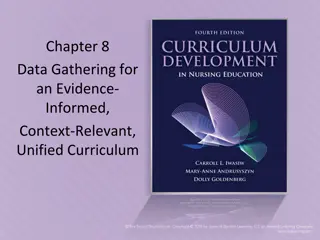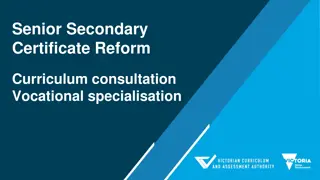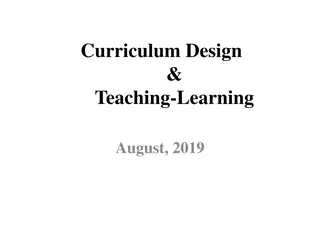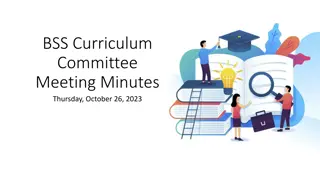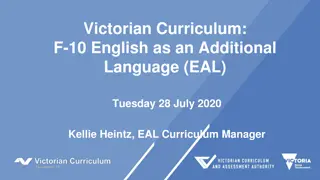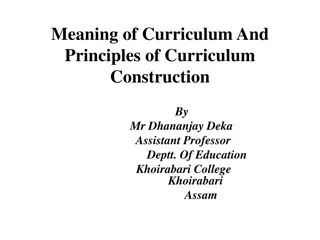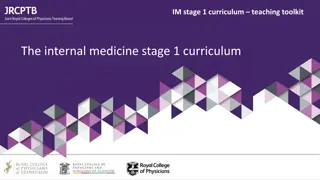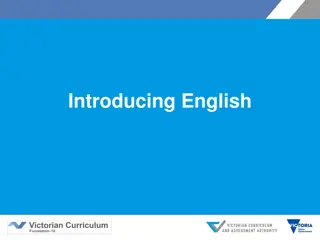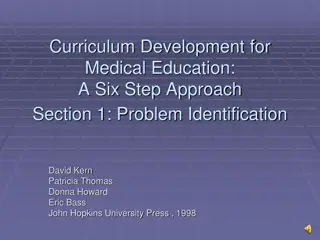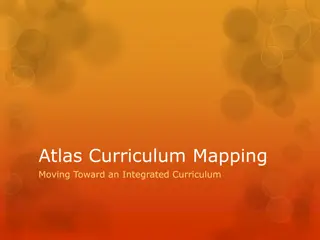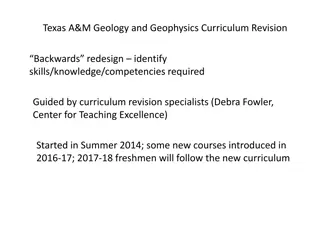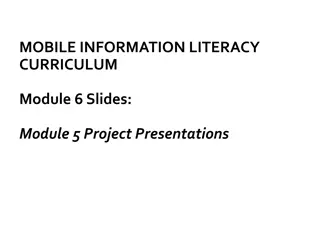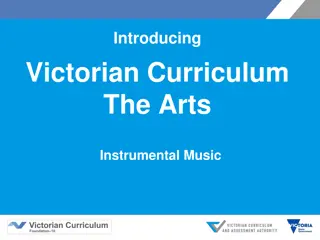Knowledge and Curriculum
Various forms of curriculum, the importance of curriculum, new trends in education, and the relationship between power and ideology in curriculum development. Understand the role of the state in curriculum development and the impact of meritocracy on the curriculum.
2 views • 16 slides
Knowledge and Curriculum
The principles of curriculum development to improve education quality, align curriculum with teaching methods, and meet student needs. Discover how innovative curriculum design influences learning outcomes and fosters independent thinking. Curriculum planners play a crucial role in creating effectiv
1 views • 21 slides
Unpacking the New ELAL Curriculum for Grades 4-6
In the spirit of reconciliation, acknowledgment of traditional Treaty lands in Alberta is highlighted, emphasizing the importance of understanding Indigenous history. The journey to the new curriculum is depicted along with the direction for curriculum development in Alberta, focusing on promoting s
1 views • 50 slides
Actions Emanating from the Evaluation of the Governance Reform
The evaluation of the governance reform within the WMO aimed to assess its alignment with strategic objectives, effectiveness in responding to societal needs, coordination efficiency, decision-making process, agility, and more. Evaluation criteria included relevance, design validity, effectiveness,
1 views • 13 slides
Understanding Contextual Factors in Curriculum Development
This chapter delves into the significance of internal and external contextual factors in shaping curriculum development. It discusses the process of gathering essential contextual data, identifying relevant sources, and integrating data to create an evidence-informed, context-relevant, unified curri
5 views • 31 slides
Overview of Victorian Curriculum F-10 Mathematics Curriculum Revisions
The Victorian Curriculum F-10 is being revised to incorporate content from the Australian Curriculum Version 9.0 with the aim of making it more manageable and aligned with Victorian priorities. The revisions focus on ensuring efficient implementation, strengthening student access to essential knowle
10 views • 23 slides
Comprehensive School Quality Assurance and Evaluation Process
A detailed insight into the Quality Assurance Department's role in school evaluation and improvement processes, including Whole School Evaluation (WSE), Follow-through initiatives, Teaching and Learning assessments, Resumption and Examination Monitoring. The process involves both internal self-evalu
0 views • 20 slides
Governance & the Curriculum Committee: Understanding Regulations and Structures for Effective Governance
This session explores the regulations and governance structures related to curriculum committees in colleges and districts, emphasizing the partnership between administration and academic senate. Key topics include establishing curriculum committees, examples of committee setups, and discussions on
2 views • 25 slides
Methods of Training Evaluation: Overview and Importance
Training and development are fast-growing fields globally, including in India. Evaluation plays a crucial role in understanding the effectiveness and efficiency of training programs for human resource development. This presentation covers the concept of training, evaluation strategies, methods/model
0 views • 61 slides
Universal Evaluation Framework: Simplifying Evaluation Processes
This session introduces the Universal Evaluation Framework (UEF) developed for evaluating QAA Scotland Enhancement Themes. Participants learn key evaluation questions, evidence capture, and the Theory of Change to enhance evaluation confidence. The QAA Scotland Evaluation Odyssey details historical
2 views • 14 slides
Implementing Blind Evaluation Pilot in HORIZON EUROPE: Key Facts and Process
HORIZON EUROPE is conducting a pilot on Blind Evaluation in the 2023-2024 work program to address biases in the research and innovation evaluation process. The pilot aims to assess the feasibility of blind evaluations in ensuring fairness and mitigating potential biases towards well-known organizati
9 views • 9 slides
Strengthening National Evaluation Capacity in the Era of Sustainable Development Goals
The presentation by Vijayalakshmi Vadivelu at the National Evaluation Capacities Conference 2017 in Istanbul focused on the importance of strengthening national evaluation capacity in alignment with the Sustainable Development Goals (SDGs). The content covers the holistic approach to national evalua
3 views • 18 slides
Exploring Developmental Evaluation for Better Decision-Making
Delve into the realm of developmental evaluation, focusing on its purpose, principles, and application in practice. Understand how developmental evaluation emphasizes real-time data collection for informed decision-making in complex systems. Learn about key principles such as developmental purpose,
0 views • 25 slides
Evaluation Practices in Macedonia: What Works, What Doesn't
The comparison between the effectiveness of evaluation practices and the presence of formal institutions in Macedonia raises questions about the impact of institutional design on outcomes. While some countries with robust evaluation institutions fall short in practice, others lacking such structures
1 views • 7 slides
Enhancing Evaluation Capabilities in Mongolia for Agenda 2030
The Mongolian Evaluation Network in collaboration with UNDP is working to integrate the 2030 Agenda into national strategies and plans, establish institutional coordination mechanisms, align budgets, and enhance data monitoring systems. Key stakeholders including government agencies, NGOs, and inter
0 views • 9 slides
Understanding Demi-Regularity in Realist Evaluation
Realist Evaluation is a theory-driven approach focusing on understanding the context and mechanisms of action behind policies and interventions. This webinar explores the concept of demi-regularity in realist evaluation, its origins, and its application in analyzing complex evidence. Key aspects cov
1 views • 16 slides
Proposed Senior Secondary Certificate Reform Curriculum Consultation for Vocational Specialisation
A new curriculum is being proposed for vocational specialisation in senior secondary certificates in Victoria. The curriculum focuses on providing flexible pathways for students with standards-based assessments, offering courses aligned with students' needs and aspirations. Feedback on the draft cur
0 views • 19 slides
Understanding Evaluation in Education
Evaluation in education is a comprehensive term that encompasses measurement, testing, and qualitative examination of student behavior. It involves both quantitative and qualitative descriptions, along with value judgments. Differentiating from mere measurement, evaluation provides a deeper analysis
0 views • 28 slides
Understanding Curriculum Design and Program Outcomes in Education
Exploring the critical terms COs and POs, this content delves into the short definitions of COs and POs, emphasizing the mapping of COs onto POs. It highlights how curriculum, assessment, and evaluation are integral in achieving program outcomes. The significance of SAR in evaluating curriculum deve
4 views • 51 slides
Sustainable Evaluation Systems Workshop Summary
Workshop on Sustainable Evaluation Systems by Stephen Porter at the NEC Conference focused on defining evaluation systems, addressing their failures, and emphasizing the importance of quality, use, and networks in achieving sustainability. Participants engaged in activities such as bingo card introd
0 views • 38 slides
Recertification and Assessment of Core Curriculum Courses
The Core Curriculum Council of the Faculty Senate presents a process for recertification and assessment of core curriculum courses to maintain integrity and quality. Courses must be recertified every four years to ensure consistency amidst changes in instructors, content, and teaching methods. State
0 views • 33 slides
BSS Curriculum Committee Meeting Overview
The BSS Curriculum Committee Meeting discussed the need to update the curriculum process due to the increasing workload and impending retirement of key personnel. The meeting also compared curriculum processes in different divisions, highlighting the roles of faculty and staff in managing curriculum
0 views • 9 slides
Impact and Evaluation Toolkit for Churches and Christian Charities
This toolkit aims to equip churches and Christian charities engaged in small-scale social action projects to think about impact, measure impact, choose data tools, reflect on evaluation data, and use it effectively. It covers principles of evaluation, setting objectives, selecting indicators, storyt
0 views • 34 slides
Overview of Monitoring and Evaluation in the GEF
The Evaluation in the GEF and Training Module focuses on promoting accountability and learning within the Global Environment Facility (GEF) through monitoring and evaluation activities. The GEF Independent Evaluation Office plays a crucial role in assessing results, effectiveness, and performance of
0 views • 25 slides
Importance of the New Victorian Curriculum F-10 EAL
The new Victorian Curriculum F-10 EAL aims to establish EAL as a standalone curriculum, provide a consistent structure across all learning areas, and recognize the diverse backgrounds and learning experiences of EAL students in Victoria. It also focuses on supporting the specific needs of EAL studen
0 views • 29 slides
Understanding Curriculum and Principles of Curriculum Construction
Curriculum is the core of the school system, facilitating the transmission of knowledge from teachers to students. It encompasses the courses, activities, and learning environment provided to pupils. Principles of curriculum construction include child-centeredness, individual differences, co-relatio
0 views • 8 slides
Developing an Evaluation Work Plan for Effective Program Assessment
This presentation by Amy D. Andrade from San Jose State University focuses on developing an Evaluation Work Plan to identify responsibilities and timelines. It covers topics such as Evaluation Coaching Support, Webinar Outlines, Logic Model, Inputs-Outputs-Outcomes, Two Approaches to Evaluation, Pro
0 views • 29 slides
Rutherford High School Curriculum Overview
Rutherford High School offers a comprehensive curriculum ranging from English to Mathematics. The curriculum night provides an overview of courses offered, course selection process, and graduation requirements. Students must complete four years of English and Mathematics, including specific assessme
0 views • 37 slides
Evaluation Synthesis in Changing Contexts: Enhancing Knowledge for Development Effectiveness
Evaluation synthesis is crucial for promoting learning, reflection, and decision-making in development work. This process involves bringing together diverse knowledge sources to generate strategic insights and facilitate wider use of evaluation findings. The Independent Office of Evaluation of IFAD
0 views • 20 slides
Overview of Victorian Curriculum Mathematics F-10
The Victorian Curriculum Mathematics F-10 provides a comprehensive framework for the development of mathematical skills from Foundation to Level 10, incorporating the Australian Curriculum while reflecting Victorian priorities and standards. It aims to equip students with essential numeracy skills f
0 views • 26 slides
Evaluation of FME Zero Emission Neighbourhoods in Smart Cities
The mid-term evaluation process of FME Zero Emission Neighbourhoods in Smart Cities involves self-evaluation, partner evaluation, and panel evaluation. The procedure includes scientific review, evaluation by scholars, and innovation assessment. Key documents like self-reports, progress reports, and
1 views • 20 slides
Overview of Regular Evaluation 2017 Findings in Estonia
In the Regular Evaluation 2017, efforts were made to maximize the benefits of evaluation outcomes for various stakeholders in Estonia such as the state, society, and institutions. The evaluation focused on a range of actions including preparing legislation, finding experts, creating self-report form
0 views • 6 slides
Comprehensive Guide to Training Evaluation Methods
This detailed guide covers the aim of evaluation, evaluation methods, techniques of evaluation, types of evaluation (formative, process, outcome, impact), and the significance of formative and process evaluation in assessing training effectiveness. Learn about the key principles and practices involv
0 views • 45 slides
Internal Medicine Stage 1 Curriculum Overview
This comprehensive guide details the Internal Medicine Stage 1 Curriculum, highlighting key components such as curriculum structure, curriculum changes, training pathways, specialty groups, and unchanged practices. The curriculum is designed to enhance training and assessment in areas like geriatric
0 views • 12 slides
Overview of Victorian English Curriculum
The Victorian Curriculum F-10, released in September 2015, serves as a foundational component of the Education State, aligning with the Australian Curriculum while reflecting Victorian priorities and standards. The English curriculum prioritizes language skills development through listening, reading
0 views • 9 slides
Six Step Approach to Problem Identification in Medical Curriculum Development
In this comprehensive guide on curriculum development for medical education, the focus is on identifying and addressing key problems in the curriculum design. The six-step approach outlined covers problem identification, needs assessment, goal setting, educational strategies, implementation, and eva
0 views • 12 slides
Enhancing Curriculum Development through Mapping for Schools
Curriculum mapping in schools involves using electronic tools to input, track, and analyze data related to curriculum, enabling stakeholders to meet standards, align content, collect real-time data on instruction, and reflect on practices for continuous improvement. Software programs like Rubicon At
1 views • 15 slides
Texas A&M Geology & Geophysics Curriculum Revision and Development
Involving a backward redesign led by curriculum revision specialists, the Texas A&M Geology and Geophysics curriculum has been undergoing changes since 2014. The revision aims to identify the necessary skills, knowledge, and competencies for students. It includes new courses introduced in 2016-17, w
0 views • 5 slides
Mobile Information Literacy Curriculum Overview
The Mobile Information Literacy Curriculum focuses on equipping individuals with essential skills to navigate the digital world effectively through mobile devices. It covers topics such as web searching, online work, information evaluation, and project presentations. The curriculum aims to bridge th
0 views • 8 slides
Victorian Curriculum in the Arts: An Overview
Explore the Victorian Curriculum framework for Instrumental Music and its integration with the Arts disciplines such as Dance, Drama, Media Arts, Music, Visual Arts, and Visual Communication Design. The curriculum provides a structured approach for teaching and learning across different year levels,
0 views • 28 slides




